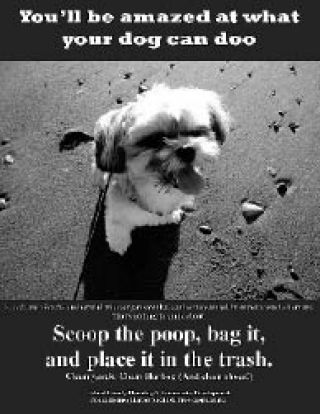FREELAND — It’s not quite like winning at Westminster, but soon your family dog may have a shot at fame and glory.
Island County is collecting photos of pups, pooches, hounds or other four-legged canines to grace signs around Freeland Park as part of the county’s dog-waste education campaign.
The “Picturing Fido” poster campaign will focus on eliminating dog waste from parks, including the beach at Holmes Harbor, where fecal coliform was discovered in the water in 2005. The discovery led to the closure of the beach for swimming and shellfish harvesting.
Starting May 1, dog owners who are committed to removing their pet’s waste will be able to submit photos, limited to 600 kilobytes, and information about the dog for consideration, Island County officials said.
The county will pick a pooch to feature on posters — and will put all of the dogs on its Web site later this year. Taking a nod from MySpace, the doggie Web site will be called Dog Space.
Posters of the dogs will be displayed at Freeland businesses, so the county is interested in finding dogs from the Freeland area.
There are four sources of potential contamination in the area, said Jan Smith, Island County’s watershed planner, including pet, human, livestock and wildlife animal waste.
Dog waste is only one part of the problem, she said.
“Is pet waste the problem? Certainly not. It is a contributing problem,” she said. “Anything related to fecal coliform is going to come from animal or human waste. We are working on getting people to focus on ‘scooping the poop,’ bagging it and throwing it in the trash.”
“It is a good time to initiate this campaign,” she added. “Better weather is coming and people are starting to get out and about more and certainly using the park.”
Smith said part of the problem with dog waste may be a generational issue. Some folks were brought up to dispose of waste by throwing it over the fence or putting it on a compost pile. She also added that a number of people moved to Whidbey Island so their dogs could run free. But Island County has a leash law and dogs must be on a leash except at the authorized off-leash dog parks.
“A lot of dogs are unlicensed and we hope with this educational campaign, people will recognize that dogs must be under control, on a leash. They are not allowed to run at large,” she said.
To help remind dog owners of their responsibilities, the county is installing dog-i-pots or pet waste sanitation facilities, which provide free bags for scooping up doggie droppings.
A community advisory meeting is planned for 5 p.m. Thursday, April 24 in Grigware Hall at Trinity Lutheran Church to discuss the latest news on the shellfish protection district.



